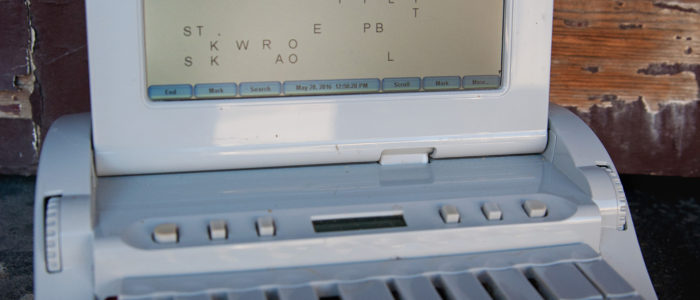Court Typist vs. Stenographer: Exploring the Key Differences
Court Typist vs. Stenographer: Exploring the Key Differences
Blog Article
Discover the Necessary Skills and Obligations of a Court Typist in Today's Lawful Landscape
As a court typist, you hold a critical position in the legal system. Your abilities exceed simply keying; they involve recognizing intricate legal terms and procedures while ensuring precision in every file. You collaborate carefully with courts and lawyers, making your role crucial for efficient communication. What certain skills do you require, and how can you adjust to the ever-evolving technological landscape? Let's discover this additionally.
The Duty of a Court Typist in the Judicial System
As the foundation of the judicial system, a court typist plays a necessary role in guaranteeing that legal proceedings are precisely documented. You are in charge of transcribing every little thing from witness testaments to judges' rulings, capturing every detail with precision. Your job assists maintain a clear and permanent record of court tasks, which is essential for future referral and appeals.In the court room, you're usually the unrecognized hero, silently ensuring that all talked words come to be written documents. You preserve discretion, comprehending the delicate nature of lawful issues. You additionally collaborate carefully with lawyers, clerks, and judges to assure the smooth circulation of info. By functioning effectively under stress, you add to the total efficiency of the judicial procedure. Your focus to information and commitment to precision not only copyright the integrity of the court but also sustain the wider pursuit of justice in society.
Vital Abilities Needed for Court Typists
Court typists need a distinct mix of abilities to master their essential function within the judicial system. Primarily, you need to have superb inputting skills, often achieving rates of 70 words per minute or more. Accuracy is essential; also a small error can lead to considerable misunderstandings in legal documents. You'll likewise require strong interest to information, making sure every word is transcribed correctly.Additionally, excellent business skills are vital for handling several instances and records successfully. Being tech-savvy is vital, as you'll use numerous software application for data processing and file management. Strong communication skills help you engage with courts, attorneys, and other court employees effectively.Lastly, a sense of professionalism and confidentiality is a must, as you'll take care of sensitive details daily. By developing these abilities, you'll be well-prepared to add considerably to the court room environment.
Understanding Lawful Terms and Procedures
As a court typist, you need to understand vital legal terms and treatments to perform your job properly. Understanding these principles not only assists you record accurately yet additionally guarantees you can comply with the circulation of court process. Allow's explore the necessary lawful vocabulary and an introduction of court procedures you must know.

Secret Legal Terms
Understanding key lawful terms is crucial for any person functioning in a court room atmosphere. You'll often run into terms like "complainant," which refers to the person initiating a lawsuit, and "offender," who replies to the claims. Recognizing the distinction in between "civil" and "criminal" cases helps you grasp the context of the proceedings. Familiarity with "subpoena" assurances you understand the legal documents engaging witnesses to affirm. In addition, terms like "evidence" and "testimony" are essential, as they connect straight to the information presented in court. Grasping these terms not only improves your efficiency as a court typist yet additionally ensures that you contribute to the accuracy and clarity of legal papers. Your role pivots on specific terms, so don't take it gently!
Court Procedures Summary
Familiarity with vital legal terms sets the stage for grasping court treatments. Understanding how a courtroom features is crucial for any kind of court typist. You'll experience procedures like accusations, where defendants listen to fees, and motions, which are demands for a court ruling. Acquaint on your own with the duties of staffs, judges, and lawyers, as each plays an essential component in proceedings. Knowing the flow of a trial-- from court option to closing arguments-- assists you precisely catch the procedures - court typist. In addition, understanding the relevance of keeping a neutral and accurate record can't be overstated. By grasping these aspects, you'll boost your efficiency in recording crucial court tasks and add substantially to the legal process. Your duty is essential in protecting the integrity of court documents
The Effect of Technology on Court Entering
Innovation's changed court keying in considerable methods. With electronic transcription tools, you can raise efficiency and accuracy, making your job simpler than ever before. And also, remote court process have altered just how you approach your work, calling for versatility to new layouts and modern technologies.
Digital Transcription Devices
As digital transcription devices remain to evolve, they're transforming the way court typists execute their responsibilities. These tools enhance the transcription procedure, allowing you to catch spoken words precisely and effectively. With voice acknowledgment software application, you can record real-time process, reducing hand-operated input and decreasing errors.Moreover, cloud-based systems enable easy accessibility to documents, so you can work collaboratively with legal groups and guarantee every person's on the same web page. Automated format features conserve you time on repeated tasks, letting you concentrate on material quality.Additionally, electronic devices enhance security, shielding delicate details via encrypted storage and regulated gain access to. By welcoming these modern technologies, you can enhance your performance and maintain the high requirements needed in the legal area.
Remote Court Proceedings
The surge of remote court process has actually considerably changed the landscape for court typists. You currently depend on technology to record and record live hearings from your home or workplace. Experience with video clip conferencing systems is necessary, as you'll require to browse them effortlessly to assure an accurate document. You'll additionally need to take care of audio high quality, as history anonymous sound or connection problems can interrupt your work. Additionally, remote proceedings require fast reasoning; you might require to make clear statements or demand repeats in real-time. Staying arranged and reliable is critical, as deadlines stay tight. Welcoming these technical advancements not just enhances your skills yet also ensures you remain an invaluable asset in today's evolving legal setting.
Accuracy and Focus to Detail in Transcription
Accuracy and focus to detail are crucial in transcription, especially for court typists. court typist. When you're recording lawful proceedings, every word counts. A single mistake can change the significance of a declaration, possibly affecting the end result of a case. You have to pay attention very carefully, ensuring that you capture every subtlety and inflection in the audio speaker's voice.Your capacity to catch typos and grammatic mistakes is necessary. You do not just kind; you confirm that the final record is a precise depiction of what was stated in court. This calls for a keen eye and a comprehensive understanding of lawful terminology.Moreover, you'll require to be knowledgeable about various accents and talking designs, as courtrooms can organize a variety of audio speakers. By sharpening your precision and focus to detail, you'll maintain the integrity of lawful files and add markedly to the judicial procedure. Your diligence in this area really makes a distinction
Time Administration and Organizational Abilities
While taking care of several jobs, efficient time management and organizational skills are find important for court typists. You'll often handle numerous due dates, from transcribing court procedures to preparing lawful documents. Prioritizing your work is vital; determine urgent tasks and tackle them initially to ensure timely submissions.Organizational abilities come right into play when you're sorting with case notes, records, and documents. Maintaining everything nicely categorized not only conserves time yet additionally reduces the danger of mistake. Using tools like calendars, to-do checklists, or specialized software program can help you stay on track and handle your time effectively.Moreover, setting details goals for every job session can increase your productivity. Break larger jobs into smaller tasks to make them more manageable. By refining these skills, you'll not only boost your efficiency yet additionally contribute considerably to the smooth procedure of the lawful procedure, ensuring every little thing runs like clockwork.
Proceeding Education and Specialist Advancement Opportunities
Investing in your skills does not quit with time monitoring and company. As a court typist, you'll discover that continuing education and learning and professional growth are necessary to staying competitive in the lawful area. Seek workshops or online courses concentrating on advanced typing techniques, lawful terminology, and transcription software application. These can hone your skills and assist you adapt to the most up to date technologies.Networking is similarly important. Join expert organizations like the National Court Reporters Association (NCRA) or neighborhood lawful associations. They often provide sources, training sessions, and conferences that can enhance your understanding and attach you with peers.Don' t fail to remember about certification programs that can improve your integrity and bankability. Remaining updated with the most recent patterns and ideal methods in legal documents will enhance your performance and accuracy, making you a very useful asset to any lawful group. Purchase your growth, and you'll enjoy the rewards throughout your profession.
Regularly Asked Questions
What Is the Typical Salary Variety for a Court Typist?
A court typist's regular wage varieties from $30,000 to $55,000 yearly, depending upon experience and place. You might additionally discover opportunities for growth with extra skills, causing increased pay in the legal field.

Are Court Typists Required to Have a Legal Level?
Court typists don't require a legal level, however having one can be useful. You'll commonly find that strong keying skills and knowledge of lawful terminology are much more important for success in this role.
What Are the Job Hours for a Court Typist?

Just How Do Court Typists Make Sure Confidentiality in Their Work?
You guarantee confidentiality by firmly taking care of sensitive papers, making use of encrypted software application, and adhering to stringent procedures. You remain knowledgeable about privacy regulations and only share information with licensed employees, maintaining count on the judicial procedure.
Can Court Typists Work From Another Location or Freelance?
Yes, you can work remotely or freelance as a court typist, especially if you have Resources dependable technology and a safe and secure atmosphere. Numerous lawful specialists now embrace remote work, providing versatility and opportunities for independent typists. As the backbone of the judicial system, a court typist plays a necessary role in assuring that legal process are properly recorded. As a court typist, you need to realize vital legal terms and treatments to execute your work efficiently. Grasping these terms not only improves your efficiency as a court typist but also guarantees that you contribute to the accuracy and clearness of legal files. The increase of remote court procedures has actually significantly changed the landscape for court typists. As a court typist, you'll find that proceeding education and professional development are important to remaining affordable in the legal field.
Report this page